formerly eScholarship Editions


|
|
|
|
Your search for
'Middle Eastern History' in subject
found 57 book(s). | Modify Search | Displaying 1 - 20 of 57 book(s) | |
| 1. | 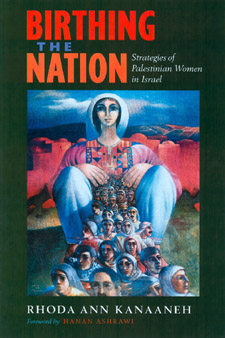 | Title: Birthing the nation: strategies of Palestinian women in Israel Author: Kanaaneh, Rhoda Ann Published: University of California Press, 2002 Subjects: Anthropology | Women's Studies | Medical Anthropology | Sociology | Postcolonial Studies | Middle Eastern History | Sociology | Postcolonial Studies | Middle Eastern History | Middle Eastern History Publisher's Description: In this rich, evocative study, Rhoda Ann Kanaaneh examines the changing notions of sexuality, family, and reproduction among Palestinians living in Israel. Distinguishing itself amid the media maelstrom that has homogenized Palestinians as "terrorists," this important new work offers a complex, nuanced, and humanized depiction of a group rendered invisible despite its substantial size, now accounting for nearly twenty percent of Israel's population. Groundbreaking and thought-provoking, Birthing the Nation contextualizes the politics of reproduction within contemporary issues affecting Palestinians, and places these issues against the backdrop of a dominant Israeli society. [brief] Similar Items |
| 2. | 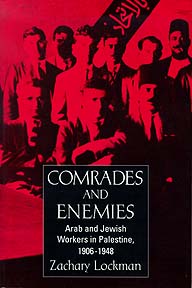 | Title: Comrades and enemies: Arab and Jewish workers in Palestine, 1906-1948 Author: Lockman, Zachary Published: University of California Press, 1996 Subjects: History | Middle Eastern History Publisher's Description: In Comrades and Enemies Zachary Lockman explores the mutually formative interactions between the Arab and Jewish working classes, labor movements, and worker-oriented political parties in Palestine just before and during the period of British colonial rule. Unlike most of the historical and sociological literature on Palestine in this period, Comrades and Enemies avoids treating the Arab and Jewish communities as if they developed independently of each other. Instead of focusing on politics, diplomacy, or military history, Lockman draws on detailed archival research in both Arabic and Hebrew, and on interviews with activists, to delve into the country's social, economic, and cultural history, showing how Arab and Jewish societies in Palestine helped to shape each other in significant ways. Comrades and Enemies presents a narrative of Arab-Jewish relations in Palestine that extends and complicates the conventional story of primordial identities, total separation, and unremitting conflict while going beyond both Zionist and Palestinian nationalist mythologies and paradigms of interpretation. [brief] Similar Items |
| 3. | 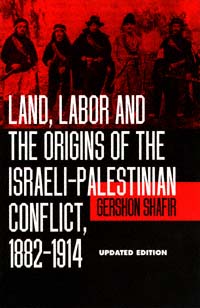 | Title: Land, labor and the origins of the Israeli-Palestinian conflict, 1882-1914 Author: Shafir, Gershon Published: University of California Press, 1996 Subjects: Middle Eastern Studies | Middle Eastern History | Labor Studies Publisher's Description: Gershon Shafir challenges the heroic myths about the foundation of the State of Israel by investigating the struggle to control land and labor during the early Zionist enterprise. He argues that it was not the imported Zionist ideas that were responsible for the character of the Israeli state, but t . . . [more] Similar Items |
| 4. | 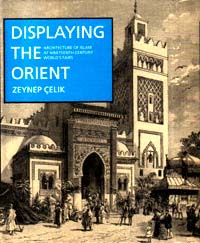 | Title: Displaying the Orient: architecture of Islam at nineteenth-century world's fairs Author: Çelik, Zeynep Published: University of California Press, 1992 Subjects: Architecture | European History | Cultural Anthropology | Middle Eastern History Publisher's Description: Gathering architectural pieces from all over the world, the Paris Universal Exposition of 1867 introduced to fairgoers the notion of an imaginary journey, a new tourism en place . Through this and similar expositions, the world's cultures were imported to European and American cities as artifacts and presented to nineteenth-century men and women as the world in microcosm, giving a quick and seemingly realistic impression of distant places.Çelik examines the display of Islamic cultures at nineteenth-century world's fairs, focusing on the exposition architecture. She asserts that certain sociopolitical and cultural trends now crucial to our understanding of historical transformations in both the West and the world of Islam were mirrored in the fair's architecture. Furthermore, dominant attitudes toward cross-cultural exchanges were revealed repeatedly in Westerners' responses to these pavilions, in Western architects' interpretations of Islamic stylistic traditions, and in the pavilions' impact in such urban centers.Although the world's fairs claimed to be platforms for peaceful cultural communication, they displayed the world according to a hierarchy based on power relations. Çelik's delineation of this hierarchy in the exposition buildings enables us to understand both the adversarial relations between the West and the Middle East, and the issue of cultural self-definition for Muslim societies of the nineteenth century. [brief] Similar Items |
| 5. | 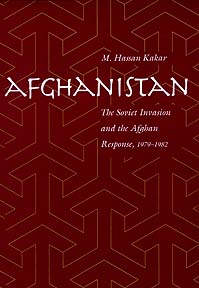 | Title: Afghanistan: the Soviet invasion and the Afghan response, 1979-1982 Author: Kakar, M. Hasan Published: University of California Press, 1997 Subjects: Middle Eastern Studies | Politics | History | Middle Eastern History Publisher's Description: Few people are more respected or better positioned to speak on the Soviet invasion of Afghanistan than M. Hassan Kakar. A professor at Kabul University and scholar of Afghanistan affairs at the time of the 1978 coup d'état, Kakar vividly describes the events surrounding the Soviet invasion in 1979 and the encounter between the military superpower and the poorly armed Afghans. The events that followed are carefully detailed, with eyewitness accounts and authoritative documentation that provide an unparalleled view of this historical moment.Because of his prominence Kakar was at first treated with deference by the Marxist government and was not imprisoned, although he openly criticized the regime. When he was put behind bars the outcry from scholars all over the world possibly saved his life. In prison for five years, he continued collecting information, much of it from prominent Afghans of varying political persuasions who were themselves prisoners.Kakar brings firsthand knowledge and a historian's sensibility to his account of the invasion and its aftermath. This is both a personal document and a historical one - Kakar lived through the events he describes, and his concern for human rights rather than party politics infuses his writing. As Afghans and the rest of the world try to make sense of Afghanistan's recent past, Kakar's voice will be one of those most listened to. [brief] Similar Items |
| 6. | 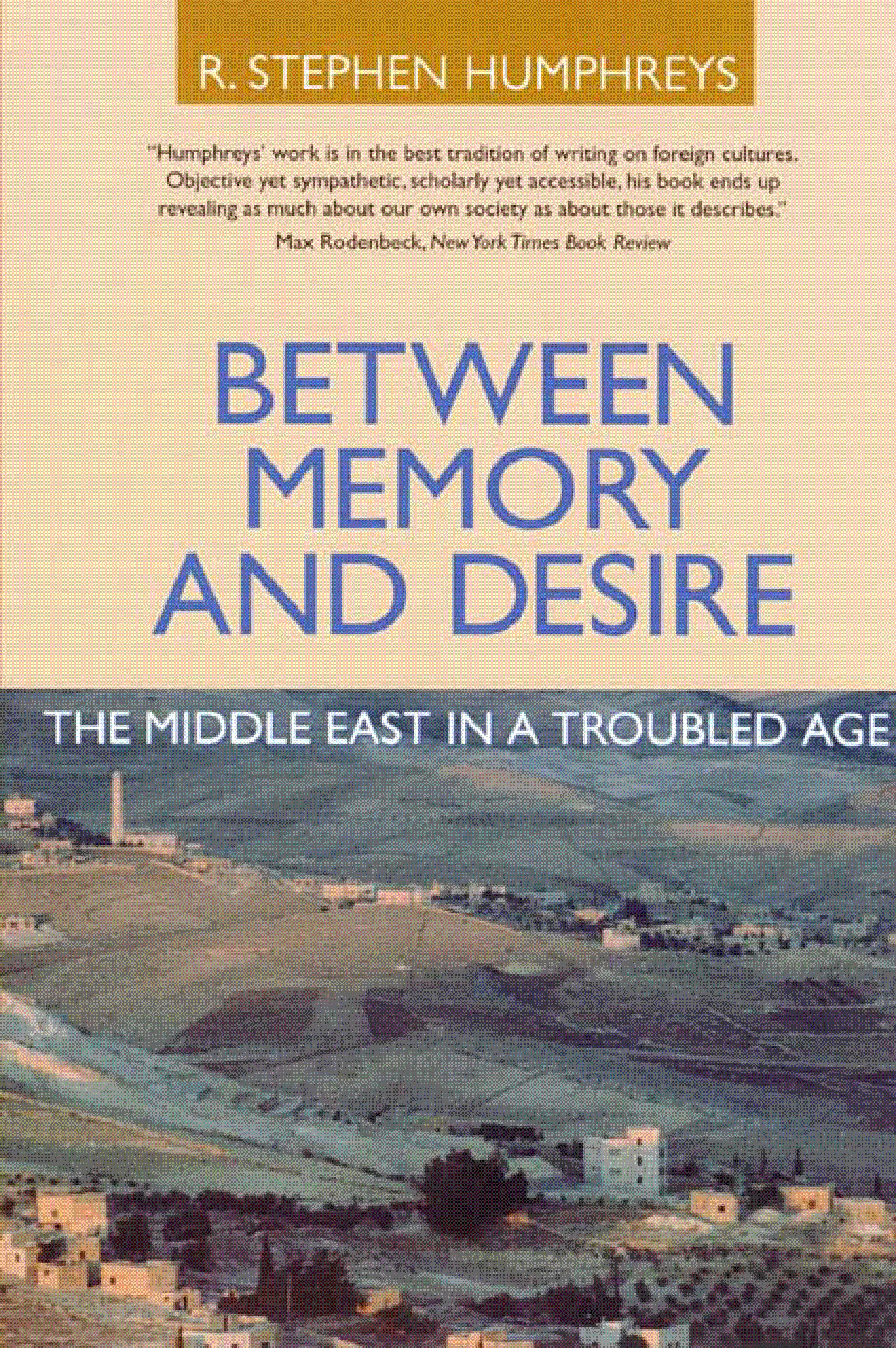 | Title: Between memory and desire: the Middle East in a troubled age Author: Humphreys, R. Stephen Published: University of California Press, 1999 Subjects: Middle Eastern Studies | Politics | Islam | Middle Eastern History Publisher's Description: Middle Easterners today are caught between memories of the past and frustrated hopes for the future. They struggle to find solutions to crises of economic stagnation, political gridlock, and cultural identity. In recent decades Islam has become central to this struggle, and almost every issue involves fierce, sometimes violent debates over the role of religion in public life. R. Stephen Humphreys's new book presents a much-needed and thoughtful analysis of Islam's place in today's Middle East. In clear, accessible language, he integrates the medieval and modern history of the region to show how the sacred and secular are tightly interwoven in its political and intellectual life. Humphreys discusses the conflicts over power and resources that engage Middle Eastern politicians and looks at the major ideologies that have shaped these conflicts. He focuses on the impact of Islam on public life and examines Muslim ways of thinking about the "secular" versus the "religious." What values does Islam put into play? What challenges does it pose to "ordinary" politics? What resources does it bring to the struggle for social justice? Humphreys recognizes the Western tendency to dismiss Middle Eastern politics as an incoherent tale of violence and fanaticism, and his book is especially valuable for its analysis of the deeper issues behind the headlines. These issues include the region's apparent inability to evolve democratic institutions, conflicts rooted in the peace settlements after World War I, and the unresolved debates over which cultural and moral values should drive Middle Eastern policy. Between Memory and Desire reminds us that Middle Easterners remember the past in specific ways: the shame of the colonial era; the disappointments since independence; and the glory of the Middle Ages, when Muslim achievements were respected throughout the world. Even if these memories are only partially true, in defining the past, they also define what the future ought to be. [brief] Similar Items |
| 7. | 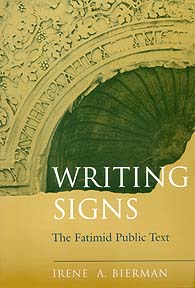 | Title: Writing signs: the Fatimid public text Author: Bierman, Irene A Published: University of California Press, 1998 Subjects: Art | Middle Eastern Studies | Middle Eastern History | Literature Publisher's Description: Irene Bierman explores the complex relationship between alphabet and language as well as the ways the two elements are socially defined by time and place. She focuses her exploration on the Eastern Mediterranean in the sixth through twelfth centuries, notably Cairo's Fatimid dynasty of 969-1171. Examining the inscriptions on Fatimid architecture and textiles, Bierman offers insight into all elements of that society, from religion to the economy, and the enormous changes the dynasty underwent during that period. Bierman addresses fundamental issues of what buildings mean, how inscriptions affect that meaning, and the role of written messages and the ceremonies into which they are incorporated in service of propagandist goals. Her method and conclusions provide a pioneering model for studying public writing in other societies and offer powerful evidence to show that writing is a highly charged and deeply embedded social practice. [brief] Similar Items |
| 8. | 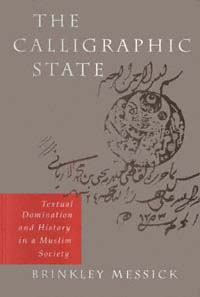 | Title: The calligraphic state: textual domination and history in a Muslim society Author: Messick, Brinkley Morris Published: University of California Press, 1992 Subjects: Anthropology | Middle Eastern History | Cultural Anthropology | Middle Eastern Studies Publisher's Description: In this innovative combination of anthropology, history, and postmodern theory, Brinkley Messick examines the changing relation of writing and authority in a Muslim society from the late nineteenth century to the present. The creation and interpretation of texts, from sacred scriptures to administrative and legal contracts, are among the fundamental ways that authority is established and maintained in a complex state. Yet few scholars have explored this process and the ways in which it changes, especially outside the Western world.Messick brings together intensive ethnography and textual analysis from a wealth of material: Islamic jurisprudence, Yemeni histories, local documents. In exploring the structure and transformation of literacy, law, and statecraft in Yemen, he raises important issues that are of comparative significance for understanding political life in other Muslim and nonwestern states as well. [brief] Similar Items |
| 9. | 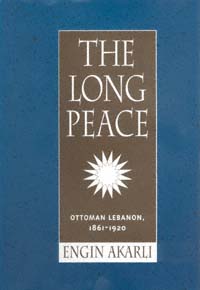 | Title: The long peace: Ottoman Lebanon, 1861-1920 Author: Akarlı, Engin Deniz Published: University of California Press, 1993 Subjects: History | Politics | Middle Eastern History | Middle Eastern Studies Publisher's Description: Long notorious as one of the most turbulent areas of the world, Lebanon nevertheless experienced an interlude of peace between its civil war of 1860 and the beginning of the French Mandate in 1920. Engin Akarli examines the sociopolitical changes resulting from the negotiations and shifting alliances characteristic of these crucial years.Using previously unexamined documents in Ottoman archives, Akarli challenges the prevailing view that attributes modernization in government to Western initiative while blaming stagnation on reactionary local forces. Instead, he argues, indigenous Lebanese experience in self-rule as well as reconciliation among different religious groups after 1860 laid the foundation for secular democracy. European intervention in Lebanese politics, however, hampered efforts to develop a correspondingly secular notion of Lebanese nationality.As ethnic and religious strife increases throughout much of eastern Europe and the Middle East, the Lebanese example has obvious relevance for our own time. [brief] Similar Items |
| 10. | 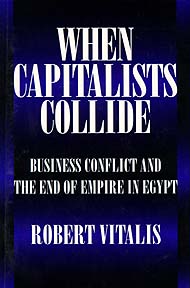 | Title: When capitalists collide: business conflict and the end of empire in Egypt Author: Vitalis, Robert 1955- Published: University of California Press, 1995 Subjects: Politics | Ancient History | Middle Eastern Studies | Middle Eastern History Publisher's Description: Robert Vitalis's empirically rich study challenges the left-nationalist paradigm through which twentieth-century Egyptian history and politics has generally been interpreted. He argues with those who explain Egyptian economic development primarily in terms of class and of power struggles between British and Egyptian entrepreneurs and politicians.Vitalis offers a rare, detailed view of the objectives and political strategies of both international firms and Egypt's own big business rivals. He highlights the career of Muhammad Ahmad 'Abbud, modern Egypt's most successful businessman. Vitalis's argument can be effectively applied to many other Third World countries and his book makes a major contribution to ongoing debates regarding class, underdevelopment, and nationalism. [brief] Similar Items |
| 11. | 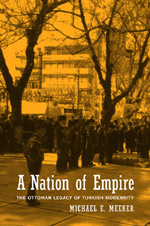 | Title: A nation of empire: the Ottoman legacy of Turkish modernity Author: Meeker, Michael E Published: University of California Press, 2002 Subjects: Anthropology | Middle Eastern Studies | Cultural Anthropology | Middle Eastern History Publisher's Description: This innovative study of modern Turkey is the result of many years of ethnographic fieldwork and archival research. Michael Meeker expertly combines anthropological and historical methods to examine the transition from the Ottoman Empire to the Turkish Republic in a major region of the country, the eastern Black Sea coast. His most significant finding is that a state-oriented provincial oligarchy played a key role in successive programs of reform over the course of more than two hundred years of imperial and national history. As Meeker demonstrates, leading individuals backed by interpersonal networks determined the outcome of the modernizing process, first during the westernizing period of the Empire, then during the revolutionary period of the Republic.To understand how such a state-oriented provincial oligarchy was produced and reproduced along the eastern Black Sea coast, Meeker integrates a contemporary ethnographic study of public life in towns and villages with a historical study of official documents, consular reports, and travel narratives. A Nation of Empire provides anthropologists, historians, and students of Eastern Europe and the Middle East with a new understanding of the complexities and contradictions of modern Turkish experience. [brief] Similar Items |
| 12. | 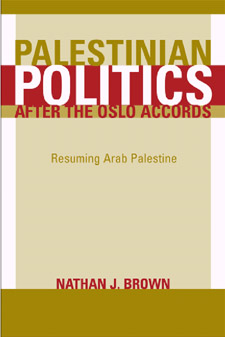 | Title: Palestinian politics after the Oslo Accords: resuming Arab Palestine Author: Brown, Nathan J Published: University of California Press, 2003 Subjects: History | Middle Eastern History | Middle Eastern Studies | Politics Publisher's Description: This timely and critically important work does what hostilities in the Middle East have made nearly impossible: it offers a measured, internal perspective on Palestinian politics, viewing emerging political patterns from the Palestinian point of view rather than through the prism of the Arab-Israeli conflict. Based on groundbreaking fieldwork, interviews with Palestinian leaders, and an extensive survey of Arabic-language writings and documents, Palestinian Politics after the Oslo Accords presents the meaning of state building and self-reliance as Palestinians themselves have understood them in the years between 1993 and 2002. Nathan J. Brown focuses his work on five areas: legal development, constitution drafting, the Palestinian Legislative Council, civil society, and the effort to write a new curriculum. His book shows how Palestinians have understood efforts at building institutions as acts of resumption rather than creation - with activists and leaders seeing themselves as recovering from an interrupted past, Palestinians seeking to rejoin the Arab world by building their new institutions on Arab models, and many Palestinian reformers taking the Oslo Accords as an occasion to resume normal political life. Providing a clear and urgently needed vantage point on most of the issues of Palestinian reform and governance that have emerged in recent policy debates - issues such as corruption, constitutionalism, democracy, and rule of law - Brown's book helps to put Palestinian aspirations and accomplishments in their proper context within a long and complex history and within the larger Arab world. [brief] Similar Items |
| 13. | 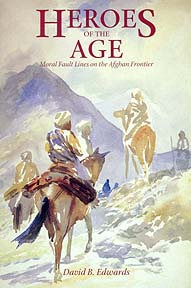 | Title: Heroes of the age: moral fault lines on the Afghan frontier Author: Edwards, David B Published: University of California Press, 1996 Subjects: Anthropology | Middle Eastern History | Middle Eastern Studies | Postcolonial Studies Publisher's Description: Much of the political turmoil that has occurred in Afghanistan since the Marxist revolution of 1978 has been attributed to the dispute between Soviet-aligned Marxists and the religious extremists inspired by Egyptian and Pakistani brands of "fundamentalist" Islam. In a significant departure from this view, David B. Edwards contends that - though Marxism and radical Islam have undoubtedly played a significant role in the conflict - Afghanistan's troubles derive less from foreign forces and the ideological divisions between groups than they do from the moral incoherence of Afghanistan itself. Seeking the historical and cultural roots of the conflict, Edwards examines the lives of three significant figures of the late nineteenth century - a tribal khan, a Muslim saint, and a prince who became king of the newly created state. He explores the ambiguities and contradictions of these lives and the stories that surround them, arguing that conflicting values within an artificially-created state are at the root of Afghanistan's current instability.Building on this foundation, Edwards examines conflicting narratives of a tribal uprising against the British Raj that broke out in the summer of 1897. Through an analysis of both colonial and native accounts, Edwards investigates the saint's role in this conflict, his relationship to the Afghan state and the tribal groups that followed him, and the larger issue of how Islam traditionally functions as an encompassing framework of political association in frontier society. [brief] Similar Items |
| 14. | 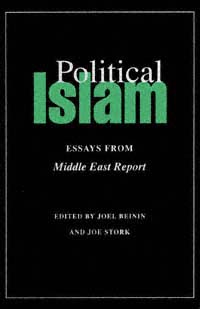 | Title: Political Islam: essays from Middle East report Author: Beinin, Joel 1948- Published: University of California Press, 1996 Subjects: Politics | Middle Eastern Studies | Middle Eastern History | Islam Publisher's Description: The essays and case studies collected here - featuring some of the best material from Middle East Report over the past decade as well as much original material - challenge the facile generalizations about what Western media and political establishments usually call "Islamic fundamentalism." The authors demonstrate the complexity of these movements and offer complementary and contrasting interpretations of their origins and significance. The material included covers a broad range of themes - including democracy and civil society, gender relations and popular culture - as they have emerged in countries throughout the Middle East and North Africa. [brief] Similar Items |
| 15. | 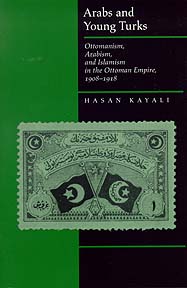 | Title: Arabs and Young Turks: Ottomanism, Arabism, and Islamism in the Ottoman Empire, 1908-1918 Author: Kayalı, Hasan Published: University of California Press, 1997 Subjects: History | Middle Eastern History | Middle Eastern Studies | Politics Publisher's Description: Arabs and Young Turks provides a detailed study of Arab politics in the late Ottoman Empire as viewed from the imperial capital in Istanbul. In an analytical narrative of the Young Turk period (1908-1918) historian Hasan Kayali discusses Arab concerns on the one hand and the policies of the Ottoman government toward the Arabs on the other. Kayali's novel use of documents from the Ottoman archives, as well as Arabic sources and Western and Central European documents, enables him to reassess conventional wisdom on this complex subject and to present an original appraisal of proto-nationalist ideologies as the longest-living Middle Eastern dynasty headed for collapse. He demonstrates the persistence and resilience of the supranational ideology of Islamism which overshadowed Arab and Turkish ethnic nationalism in this crucial transition period. Kayali's study reaches back to the nineteenth century and highlights both continuity and change in Arab-Turkish relations from the reign of Abdulhamid II to the constitutional period ushered in by the revolution of 1908. Arabs and Young Turks is essential for an understanding of contemporary issues such as Islamist politics and the continuing crises of nationalism in the Middle East. [brief] Similar Items |
| 16. | 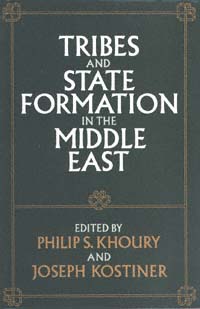 | Title: Tribes and state formation in the Middle East Author: Khoury, Philip S. (Philip Shukry) 1949- Published: University of California Press, 1991 Subjects: History | Middle Eastern History | Middle Eastern Studies | Politics Publisher's Description: Tribes and State Formation is the first effort to bring together the disciplines of history, anthropology, and political science around a major topic that none of these alone is adequately equipped to address. How and why did certain tribal societies metamorphose over time into states? Scholars concerned with general questions of theory and methodology and the interaction of anthropology and history, as well as political scientists and sociologists concerned with concepts of the state in the Middle East and other developing regions, will be well served by this innovative work.The articles by an array of distinguished scholars cover a wide range of topics: the relationship of ideology to tribal and state power, comparisons between different regional patterns of tribe-state interaction, historical case studies from North Africa, the Arabian Peninsula, and Iran extending to the contemporary period; theoretical and methodological inquiries, and systematic reviews of the literature on tribes and states. The articles argue against a unilinear approach to the study of tribes and state formation by emphasizing that states often existed alongside tribes and even created tribes for their own purposes. Some case studies emphasize the incompatibility of states and tribalism, while others illustrate the many areas in which tribes actually enhanced rather than impeded state formation. [brief] Similar Items |
| 17. |  | Title: Intimate enemies: Jews and Arabs in a shared land Author: Benvenisti, Meron 1934- Published: University of California Press, 1995 Subjects: Politics | Middle Eastern Studies | Jewish Studies | Middle Eastern History Publisher's Description: As Israelis and Palestinians negotiate separation and division of their land, Meron Benvenisti, former Deputy Mayor of Jerusalem, maintains that any expectations for "peaceful partition" are doomed. In his brave and controversial new book, he raises the possibility of a confederation of Israel/Palestine, the only solution that he feels will bring lasting peace.The seven million people in the territory between Jordan and the Mediterranean are mutually dependent regarding employment, water, land use, ecology, transportation, and all other spheres of human activity. Each side, Benvenisti says, must accept the reality that two national entities are living within one geopolitical entity - their conflict is intercommunal and will not be resolved by population transfers or land partition.A geographer and historian by training, a man passionately rooted in his homeland, Benvenisti skillfully conveys the perspective of both Israeli and Palestinian communities. He recognizes the great political and ideological resistance to a confederation, but argues that there are Israeli Jews and Palestinians who can envision an undivided land, where attachment to a common homeland is stronger than militant tribalism and segregation in national ghettos. Acknowledging that equal coexistence between Israeli and Palestinian may yet be an impossible dream, he insists that such a dream deserves a place in the current negotiations."Meron Benvenisti is the Middle East expert to whom Middle East experts go for advice . . . the most oft-quoted and oft-damned analyst in Israel." - from the Foreword by Thomas L. Friedman [brief] Similar Items |
| 18. | 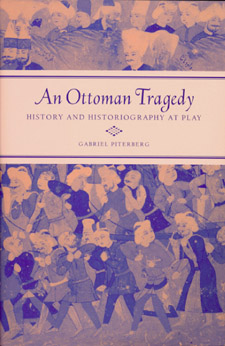 | Title: An Ottoman tragedy: history and historiography at play Author: Piterberg, Gabriel 1955- Published: University of California Press, 2003 Subjects: History | Middle Eastern History | Historiography | Middle Eastern Studies Publisher's Description: In the space of six years early in the seventeenth century, the Ottoman Empire underwent such turmoil and trauma - the assassination of the young ruler Osman II, the re-enthronement and subsequent abdication of his mad uncle Mustafa I, for a start - that a scholar pronounced the period's three-day-long dramatic climax "an Ottoman Tragedy." Under Gabriel Piterberg's deft analysis, this period of crisis becomes a historical laboratory for the history of the Ottoman Empire in the seventeenth century - an opportunity to observe the dialectical play between history as an occurrence and experience and history as a recounting of that experience. Piterberg reconstructs the Ottoman narration of this fraught period from the foundational text, produced in the early 1620s, to the composition of the state narrative at the end of the seventeenth century. His work brings theories of historiography into dialogue with the actual interpretation of Ottoman historical texts, and forces a rethinking of both Ottoman historiography and the Ottoman state in the seventeenth century. A provocative reinterpretation of a major event in Ottoman history, this work reconceives the relation between historiography and history. [brief] Similar Items |
| 19. | 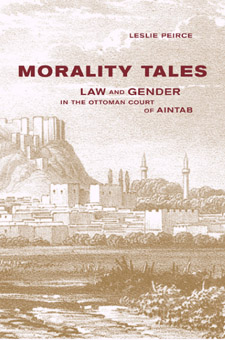 | Title: Morality tales: law and gender in the Ottoman court of Aintab Author: Peirce, Leslie P Published: University of California Press, 2003 Subjects: History | Middle Eastern Studies | Middle Eastern History | Gender Studies Publisher's Description: In this skillful analysis, Leslie Peirce delves into the life of a sixteenth-century Middle Eastern community, bringing to light the ways that women and men used their local law court to solve personal, family, and community problems. Examining one year's proceedings of the court of Aintab, an Anatolian city that had recently been conquered by the Ottoman sultanate, Peirce argues that local residents responded to new opportunities and new constraints by negotiating flexible legal practices. Their actions and the different compromises they reached in court influenced how society viewed gender and also created a dialogue with the ruling regime over mutual rights and obligations. Locating its discussion of gender and legal issues in the context of the changing administrative practices and shifting power relations of the period, Morality Tales argues that it was only in local interpretation that legal rules acquired vitality and meaning. [brief] Similar Items |
| 20. | 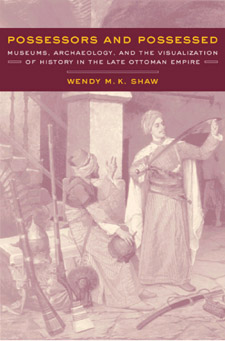 | Title: Possessors and possessed: museums, archaeology, and the visualization of history in the late Ottoman Empire Author: Shaw, Wendy M. K 1970- Published: University of California Press, 2003 Subjects: History | Middle Eastern Studies | Art | Middle Eastern History Publisher's Description: Possessors and Possessed analyzes how and why museums - characteristically Western institutions - emerged in the late-nineteenth-century Ottoman Empire. Shaw argues that, rather than directly emulating post-Enlightenment museums of Western Europe, Ottoman elites produced categories of collection and modes of display appropriate to framing a new identity for the empire in the modern era. In contrast to late-nineteenth-century Euro-American museums, which utilized organizational schema based on positivist notions of progress to organize exhibits of fine arts, Ottoman museums featured military spoils and antiquities long before they turned to the "Islamic" collections with which they might have been more readily associated. The development of these various modes of collection reflected shifting moments in Ottoman identity production. Shaw shows how Ottoman museums were able to use collection and exhibition as devices with which to weave counter-colonial narratives of identity for the Ottoman Empire. Impressive for both the scope and the depth of its research, Possessors and Possessed lays the groundwork for future inquiries into the development of museums outside of the Euro-American milieu. [brief] Similar Items |